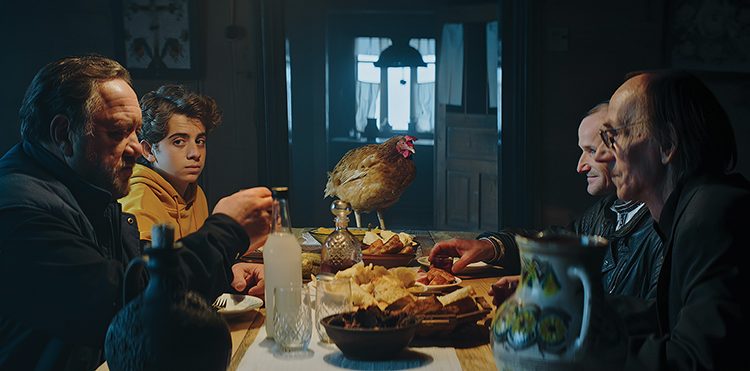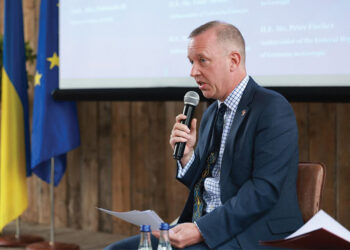This December, the 25th Tbilisi International Film Festival (TIFF) unfurled its banners at Amirani Cinema amidst a politically charged atmosphere, offering a weeklong celebration of cinema. Yet, this year’s TIFF wasn’t just a cinematic event—it was a cultural statement, an act of defiance, and a space for reflection on freedom, equality, and justice. While the screens flickered with world-class films, the festival echoed with the tension of Georgia’s current political climate.
A European Vision in Film
Opening the European Film Academy section was Pedro Almodóvar’s The Room Next Door (Spain, 2024). Almodóvar’s latest work is a return to themes of solitude, familial bonds, and suppressed desires, delivering a narrative both intensely personal and universally resonant. Set in a single apartment complex, the film unravels the lives of its inhabitants, drawing viewers into their secret struggles. Almodóvar’s characteristic vibrant color palette contrasts poignantly with the emotional bleakness of the characters. Themes of isolation and connection in The Room Next Door feel especially poignant in today’s fragmented world, marking the film as a high point of the festival.
The Oscars Contenders section launched with The Girl with the Needle by Magnus von Horn (Denmark/Poland/Sweden, 2024), a harrowing psychological drama. Von Horn crafts a narrative centered on a young woman grappling with the scars of childhood abuse. The film’s stark visual style mirrors the protagonist’s journey of reclaiming her identity. Sparse dialogue and a haunting score amplify the emotional weight, creating a tension that lingers long after the credits roll. This piece epitomizes the festival’s commitment to showcasing films that delve into the depths of human resilience and vulnerability.
The European Forum presented Sex by Norwegian director Dag Johan Haugerud. As an audacious exploration of societal taboos, the film weaves together stories of individuals navigating the complexities of desire, consent, and identity, offering a nuanced critique of contemporary sexual politics. Haugerud’s ability to balance humor with poignant social commentary sets Sex apart as a provocative yet deeply empathetic work. The director employs a fragmented narrative structure, compelling viewers to piece together the characters’ motivations and moral dilemmas.

Explorations Beyond Borders
The Tour d’Europe section showcased Cyril Schäublin’s Those Who Are Fine (Switzerland, 2017), a minimalist masterpiece that examines the alienation inherent in modern capitalism. Set in Zurich, the film
follows a series of loosely connected vignettes, capturing the mundane interactions of its characters. Schäublin’s deliberate pacing and static camera work highlight the disconnection between individuals in an increasingly transactional society. Despite its understated tone, the film delivers a sharp critique of how technology and bureaucracy dehumanize relationships, making it a standout in this year’s lineup.
Zaza Buadze’s My Carpathian Grandpa (Ukraine/Italy, 2023) opened the Ukrainian Story section, offering a heartfelt intergenerational narrative. The film follows a young man returning to his ancestral village to care for his grandfather, uncovering long-buried family secrets in the process. Buadze masterfully intertwines personal drama with broader reflections on the resilience of Ukrainian culture amidst political turmoil. The lush Carpathian landscapes serve as both a literal and metaphorical backdrop, emphasizing the enduring connection between people and their heritage.
A Silent Georgian Panorama
The festival’s most striking absence was the Georgian Panorama, canceled as an act of protest. TIFF’s organizers released a powerful statement condemning the Georgian government’s actions against peaceful protesters and its decision to halt EU integration processes.
“Every film we show tells about the struggle for personal freedom, equality, and justice,” read the statement. The festival vowed to screen Georgian works in the future, “when the country returns to the European path.”
This decision resonated deeply within the festival’s walls. On opening night, Amirani Cinema transformed into a platform for Georgian filmmakers to express their solidarity with protestors, substituting what would have been the screening of Tato Kotetishvili’s Holy Electricity. This absence spoke volumes, emphasizing the critical interplay between art and activism.
Cinema as Resistance
TIFF was always more than a film festival; it was a crucible of resistance. By curating a program that juxtaposed intimate human stories with grand sociopolitical narratives, the festival reflected Georgia’s ongoing struggles and aspirations. In a year when the festival celebrated its silver anniversary, TIFF became a reminder that cinema is not just entertainment, but a vital medium of discourse and dissent. The cancellation of the Georgian Panorama was not a loss—it was a profound statement that resonated louder than any film could.
The 25th TIFF proves that art and activism are inseparable. As Georgia navigates its uncertain political future, TIFF stands as a bastion of cultural resistance. Whether through Almodóvar’s intimate storytelling or Buadze’s intergenerational narrative, the festival affirmed that cinema has the power to challenge, unite, and inspire.
By Ivan Nechaev














